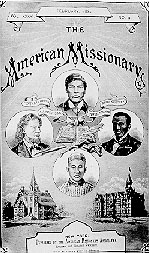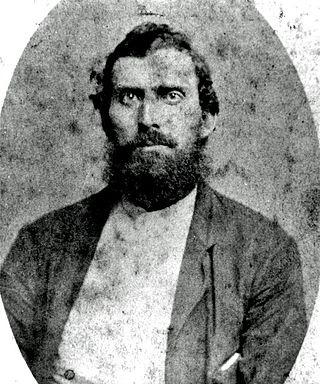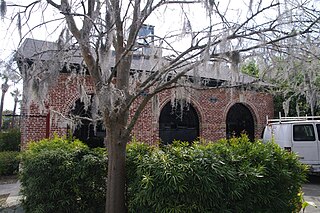Related Research Articles

The American Civil War was a civil war in the United States between the Union and the Confederacy, which was formed in 1861 by states that had seceded from the Union. The central conflict leading to the war was a dispute over whether slavery should be permitted to expand into the nation's western territories, leading to more slave states, or be prohibited from doing so, which many believed would place slavery on a course of ultimate extinction.

The Confederate States of America (CSA), commonly referred to as the Confederate States (C.S.), the Confederacy, or the South, was an unrecognized breakaway republic in the Southern United States that existed from February 8, 1861, to May 9, 1865. The Confederacy comprised eleven U.S. states that declared secession and warred against the United States during the American Civil War. The states were South Carolina, Mississippi, Florida, Alabama, Georgia, Louisiana, Texas, Virginia, Arkansas, Tennessee, and North Carolina.

The Reconstruction era was a period in United States history following the American Civil War, dominated by the legal, social, and political challenges of abolishing slavery and reintegrating the eleven former Confederate States of America into the United States. During this period, three amendments were added to the United States Constitution to grant equal civil rights to the newly freed slaves. Despite this, former Confederate states often used poll taxes, literacy tests, and terrorism to discourage or prevent voting and intimidate and control people of color.

The Compromise of 1877, also known as the Wormley Agreement, the Bargain of 1877, or the Corrupt Bargain, was an unwritten political deal in the United States to settle the intense dispute over the results of the 1876 presidential election, ending the filibuster of the certified results and the threat of political violence in exchange for an end to federal Reconstruction.

The American Missionary Association (AMA) was a Protestant-based abolitionist group founded on September 3, 1846 in Albany, New York. The main purpose of the organization was abolition of slavery, education of African Americans, promotion of racial equality, and spreading Christian values. Its members and leaders were of both races; The Association was chiefly sponsored by the Congregationalist churches in New England. The main goals were to abolish slavery, provide education to African Americans, and promote racial equality for free Blacks. The AMA played a significant role in several key historical events and movements, including the Civil War, Reconstruction, and the Civil Rights Movement.

Alabama was central to the Civil War, with the secession convention at Montgomery, the birthplace of the Confederacy, inviting other slaveholding states to form a southern republic, during January–March 1861, and to develop new state constitutions. The 1861 Alabaman constitution granted citizenship to current U.S. residents, but prohibited import duties (tariffs) on foreign goods, limited a standing military, and as a final issue, opposed emancipation by any nation, but urged protection of African-American slaves with trials by jury, and reserved the power to regulate or prohibit the African slave trade. The secession convention invited all slaveholding states to secede, but only 7 Cotton States of the Lower South formed the Confederacy with Alabama, while the majority of slave states were in the Union at the time of the founding of the Confederacy. Congress had voted to protect the institution of slavery by passing the Corwin Amendment on March 4, 1861, but it was never ratified.

South Carolina was the first state to secede from the Union in December 1860, and was one of the founding member states of the Confederacy in February 1861. The bombardment of the beleaguered U.S. garrison at Fort Sumter in Charleston Harbor on April 12, 1861, is generally recognized as the first military engagement of the war. The retaking of Charleston in February 1865, and raising the flag again at Fort Sumter, was used for the Union symbol of victory.
Walter Lynwood Fleming (1874–1932) was an American historian of the South and Reconstruction. He was a leader of the Dunning School of scholars in the early 20th century, who addressed Reconstruction era history using historiographical technique. He was a professor at Vanderbilt University from 1917 through his career, also serving as Dean of the School of Arts and Sciences, and Director of the Graduate School. A prolific writer, he published ten books and 166 articles and reviews. The son of a plantation owner who had slaves, Fleming was sympathetic to White supremacist arguments and Democratic Party positions of his era while critical of Republicans and Reconstruction.
Avery Odelle Craven was an American historian who wrote extensively about the nineteenth-century United States, the American Civil War and Congressional Reconstruction from a then-revisionist viewpoint sympathetic to the Lost Cause as well as democratic failings during his own lifetime.
The bibliography of the American Civil War comprises books that deal in large part with the American Civil War. There are over 60,000 books on the war, with more appearing each month. Authors James Lincoln Collier and Christopher Collier stated in 2012, "No event in American history has been so thoroughly studied, not merely by historians, but by tens of thousands of other Americans who have made the war their hobby. Perhaps a hundred thousand books have been published about the Civil War."

This is a selected bibliography of the main scholarly books and articles of Reconstruction, the period after the American Civil War, 1863–1877.

Brooks Donohue Simpson is an American historian and an ASU Foundation Professor of History at Arizona State University, specializing in American political and military history, especially the American Civil War and Reconstruction eras and the American presidency.

In the United States, Southern Unionists were white Southerners living in the Confederate States of America opposed to secession. Many fought for the Union during the Civil War. These people are also referred to as Southern Loyalists, Union Loyalists, or Lincoln's Loyalists. Pro-Confederates in the South derided them as "Tories". During Reconstruction, these terms were replaced by "scalawag", which covered all Southern whites who supported the Republican Party.

The Bocock–Isbell House is a structure within the Appomattox Court House National Historical Park. It was registered in the National Park Service's database of Official Structures on June 26, 1989.

This bibliography of Andrew Johnson is a list of major works about Andrew Johnson, the 17th president of the United States.

Mark Grimsley is an American professor of History at Ohio State University. His 1995 book, The Hard Hand of War: Union Military Policy Toward Southern Civilians 1861-1865, earned second place in the Gilder Lehrman Lincoln Prize category.
In general the bibliography of the American Civil War comprises over 60,000 books on the war, with more appearing each month. There is no complete bibliography to the war; the largest guide to books is over 40 years old and lists over 6,000 titles selected by leading scholars. The largest guides to the historiography annotates over a thousand titles.

Ulysses S. Grant was the 18th president of the United States (1869–1877) following his success as military commander in the American Civil War. Under Grant, the Union Army defeated the Confederate military and secession, the war ending with the surrender of Robert E. Lee's army at Appomattox Court House. As president, Grant led the Radical Republicans in their effort to eliminate vestiges of Confederate nationalism and slavery, protect African American citizenship, and pursued Reconstruction in the former Confederate states. In foreign policy, Grant sought to increase American trade and influence, while remaining at peace with the world. Although his Republican Party split in 1872 as reformers denounced him, Grant was easily reelected. During his second term the country's economy was devastated by the Panic of 1873, while investigations exposed corruption scandals in the administration. Although still below average, his reputation among scholars has significantly improved in recent years because of greater appreciation for his commitment to civil rights, moral courage in his prosecution of the Ku Klux Klan, and enforcement of voting rights.

The Reconstruction Era National Historical Park, formerly Reconstruction Era National Monument, is a United States National Historical Park in Beaufort County, South Carolina established by President Barack Obama in January 2017 to preserve and commemorate activities during the Reconstruction Era that followed the American Civil War. The monument was the first U.S. National Monument dedicated to the Reconstruction Era. The John D. Dingell, Jr. Conservation, Management, and Recreation Act, signed March 12, 2019, by President Donald Trump, re-designated it as a national historical park. It is administered by the National Park Service.
Kate Masur is an American historian and author. She is a professor of history at Northwestern University.
References
- ↑ Wallen, Doug (2007-09-30). "Spit Toons: A Philly author's short stories exhibit a rare sense of history". Philadelphia Weekly Online. Archived from the original on 2007-09-30. Retrieved 2021-01-01.
- ↑ "Small Town Boy". Nashville Scene. Retrieved 2021-01-01.
- 1 2 3 "Greg Downs." Gale Literature: Contemporary Authors, Gale, 2016. Gale Literature Resource Center. Accessed 31 Dec. 2020.
- ↑ Downs, Gregory P. (2011). Declarations of Dependence: The Long Reconstruction of Popular Politics in the South, 1861-1908. Univ of North Carolina Press. ISBN 978-0-8078-3444-2.
- 1 2 "Gregory Downs — People in the Social Science Departments at UC Davis". 14 June 2022.
- ↑ Downs, Greg, 1971- (2006). Spit baths : stories. Athens: University of Georgia Press. ISBN 0-8203-2846-4. OCLC 62804656.
{{cite book}}: CS1 maint: multiple names: authors list (link) CS1 maint: numeric names: authors list (link) - ↑ "Fiction Book Review: Spit Baths". www.publishersweekly.com. Retrieved 2021-01-01.
- ↑ Spit Baths. Kirkus Reviews.
- ↑ Rubin, Joey (2006-12-14). "REVIEW / Desperate lives viewed through the refracting lens of history". SFGATE. Retrieved 2021-01-01.
- ↑ Woodall, Martha (2007-02-01). "Spit Baths by Greg Downs". PopMatters. Retrieved 2021-01-01.
- ↑ "In short, it's very entertaining". Lexington Herald-Leader. 2007-02-04. p. 49. Retrieved 2021-01-01.
- ↑ Downs, Gregory (May 2012). "The Mexicanization of American Politics: The United States' Transnational Path from Civil War to Stabilization". The American Historical Review. 117 (2): 387–409. doi: 10.1086/ahr.117.2.387 . S2CID 154139747.
- ↑ Downs, Gregory (2020-06-25). "Toppling of the Ulysses Grant statue is no way to treat history" . SFChronicle.com. Retrieved 2021-01-01.
- ↑ Downs, Gregory (February 25, 2022) [February 25, 2022]. "The S.F. school board renaming attempt was a disaster. It can still be done right". The San Francisco Chronicle. Archived from the original on December 6, 2022. Retrieved July 26, 2024.
- ↑ Gregory P. Downs. "Gregory P. Downs". The Atlantic. Retrieved 2021-01-01.
- ↑ Downs, Gregory P. "Analysis | Why the second American Revolution deserves as much attention as the first". Washington Post. ISSN 0190-8286 . Retrieved 2021-01-01.
- ↑ Downs, Gregory P. (March 2015). "Mapping Occupation: Force, Freedom, and the Army in Reconstruction". mappingoccupation.org. Retrieved 2021-01-01.
- ↑ Binnington, Ian (March 2016). McClurken, Jeffrey (ed.). "Mapping Occupation: Force, Freedom, and the Army in Reconstruction". Journal of American History. 102 (4): 1279–1280. doi:10.1093/jahist/jav837. ISSN 0021-8723.
- ↑ Ali, Omar H. (2013). "Review of Declarations of Dependence: The Long Reconstruction of Popular Politics in the South, 1861—1908". The American Historical Review. 118 (2): 521–522. doi:10.1093/ahr/118.2.521. ISSN 0002-8762. JSTOR 23425945.
- ↑ Mobley, Joe A. (2011). "Review of Declarations of Dependence: The Long Reconstruction of Popular Politics in the South, 1861—1908". The North Carolina Historical Review. 88 (4): 429–430. ISSN 0029-2494. JSTOR 23523599.
- ↑ Bordewich, Fergus M. (2015-05-01). "A Patchwork Occupation". Wall Street Journal. ISSN 0099-9660 . Retrieved 2021-01-01.
- ↑ Davis, Robert S. "After Appomattox: Military Occupation and the Ends of War". www.nyjournalofbooks.com. Retrieved 2021-01-01.